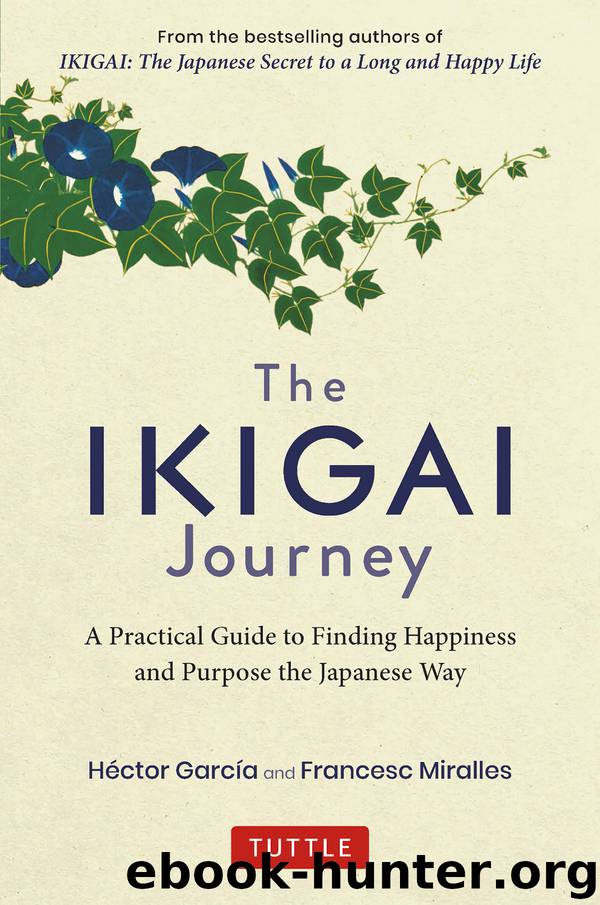The Ikigai Journey by Hector Garcia

Author:Hector Garcia
Language: eng
Format: epub
Publisher: Tuttle Publishing
15th STATION
KINDERGARTEN
Recovering the power of children
Imagine your train now passes by situations from your childhood you had almost forgotten about. You will probably be overcome by a feeling of wistfulness and maybe even sadness. This very emotion sometimes creeps up on us when we contemplate a group of happy children in a park.
Why is that? Could it be that the children’s game reminds us of values and dreams we have abandoned by the wayside?
Sometimes getting back what we left behind at kindergarten, before it is too late, is the jolt our life needs.
Watanabe, the star of the movie Ikiru (生 きる, “To Live”), one of Akira Kurosawa’s masterpieces, discovers he has stomach cancer and that he has less than a year to live. His initial reaction is to meet up with a novelist friend and head out on the town to let himself go in the delights of the Tokyo night. In one of the nightclubs they visit, Watanabe asks the pianist to play “Gondola no Uta” (“The Gondola Song”) and starts to sing it himself:
Life is brief,
fall in love,
crimson lips
that fade away
while we are swept up in tides of passion
only to then grow cold,
because there is no tomorrow.
Climb into her gondola,
Before the flush of her cheeks fades away,
for all of you who will come here no more.
Before the gondola gets lost among the waves,
a hand on her shoulder
for those who will not return here.
Before the flame in our hearts
flutters and dies
for those who will never return today.
This song makes him remember how brief life is and how important it is to live it passionately, with an ikigai as a beacon, precisely what Watanabe has not done in all his years devoted to a job he doesn’t like.
From that point on, his life takes a new heading. He puts aside his work routine as a bureaucrat and devotes his remaining energy to transforming a waste ground in his neighborhood into a park for children to play in. He dedicates his final months to fighting against the Japanese government bureaucracy to make his childhood dream of a park with swings come true.
The movie ends with Watanabe contemplating the finished park as he again sings “Gondola no Uta.”
Download
This site does not store any files on its server. We only index and link to content provided by other sites. Please contact the content providers to delete copyright contents if any and email us, we'll remove relevant links or contents immediately.
| Ethics | Etiquette |
| Fashion & Image | Health & Stress |
| Motivation & Self-Improvement | Work Life Balance |
| Workplace Culture |
Tools of Titans by Timothy Ferriss(6944)
Change Your Questions, Change Your Life by Marilee Adams(6639)
Deep Work by Cal Newport(5458)
Man-made Catastrophes and Risk Information Concealment by Dmitry Chernov & Didier Sornette(4733)
Big Magic: Creative Living Beyond Fear by Elizabeth Gilbert(4721)
The Slight Edge by Jeff Olson(4719)
Digital Minimalism by Cal Newport;(4529)
The Motivation Myth by Jeff Haden(4523)
Stone's Rules by Roger Stone(4415)
Ego Is the Enemy by Ryan Holiday(3989)
The Laws of Human Nature by Robert Greene(3942)
Tuesdays with Morrie by Mitch Albom(3832)
Rising Strong by Brene Brown(3779)
Eat That Frog! by Brian Tracy(3512)
Skin in the Game by Nassim Nicholas Taleb(3459)
The Money Culture by Michael Lewis(3283)
Skin in the Game: Hidden Asymmetries in Daily Life by Nassim Nicholas Taleb(3263)
Believe It to Achieve It by Brian Tracy & Christina Stein(3204)
Bullshit Jobs by David Graeber(3177)
